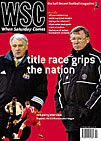 Former professional footballer Dai Thomas is given a custodial sentence in Cardiff v Leeds FA Cup fall-out, reports Paul Ashley-Jones
Former professional footballer Dai Thomas is given a custodial sentence in Cardiff v Leeds FA Cup fall-out, reports Paul Ashley-Jones
The aftermath of the Cardiff v Leeds FA Cup tie has seen the conviction of a number of Cardiff fans including one hooligan, David (Dai) Thomas, who received a custodial sentence for his part, which included throwing an advertising hoarding at Leeds supporters. What has made Dai Thomas the subject of media attention is that he was a former professional footballer with Cardiff City. It was also not his first offence.
Thomas began his playing career at Swansea City and broke into the first team under manager Jan Molby in 1996. A striker, he proved himself a hit with the fans, who unimaginatively nicknamed him “Pyscho” due to his aggressive, whole-hearted approach. Thomas was more than just a Third Division target man however. He showed good technical ability in addition to scoring on a regular basis and was capped by Wales at Under-21 level. When Swansea lost in the play-off final in 1997, Graham Taylor’s Watford signed him for £110,000.
It was a classic example of a player mak- ing the wrong move at the wrong time. At The Vetch, Molby recognised that Thomas needed careful handling, both mentally and physically. A strict training regime and plenty of fatherly advice was the order of the day. Even then, nothing would stop Thomas removing his shirt every time he scored, despite continually getting booked for it. At Watford, far from home and with money to burn, it proved difficult for him to remain focused – a club with a large squad and Premiership ambitions probably didn’t have the time or inclination to nurture his talent and manage his personality. The move predictably failed to work out, but Cardiff City were prepared to offer him another chance in 1998.
Two years later, Thomas’s real prob-lems began when he was filmed at Euro 2000 among a crowd of England fans involved in violence before the game against Germany. Despite claims that he was not involved in the trouble itself, it was clearly a stupid position for a professional footballer to allow himself to get into. Arrested and deported, Thomas’s career with Cardiff was effectively over and he slipped right down into Welsh non-league football, eventually winding up at Llanbradach in the South Wales Amateur League at the time of the Cardiff v Leeds game.
Many players don’t make the grade but they don’t often turn into football hooligans. While he was convicted as a Cardiff City hooligan, Thomas had displayed no such attachment to the club when scoring one of the goals that saw Swansea win 3-1 at Ninian Park in 1996. Indeed, his overzealous reaction to the goal helped cement his popularity with the Swans fans. And as a Welshman, his “support” for England in Euro 2000 also suggests he was more interested in what happened off the pitch than on it.
What dismayed many supporters about seeing Thomas on television that summer was not just his actions but his appearance. Clearly overweight and unfit, it was now obvious his professional career was over. Following his release by Cardiff he was unable to get a contract at any club of a reasonable standard. His skill and power would have seen him become an instant hit in the League of Wales and this might have proved a platform to relaunch his Football League career (as it did for Tony Bird, who had replaced Thomas at Swansea). Thomas’s reputation, however, went before him and there were to be no further chances.
With his recent conviction Thomas has brought a formal end to his career as he is now banned from all football grounds in England and Wales for the next six years. His lawyer painted a pathetic picture of him both during and after the trial. Unemployed and on benefit, he had saved nothing from his football career. Those of us who enjoyed Dai Thomas’s talent and shared his goal celebrations will hope he can learn from the experience, but it is hope more than expectation.
From WSC 182 April 2002. What was happening this month